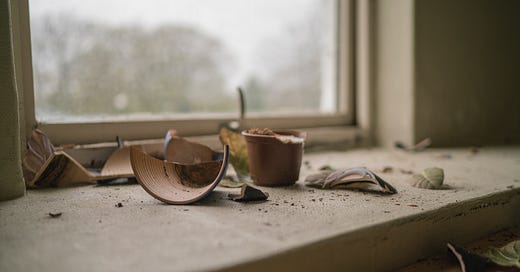I.
Last week I put a first bandaid on my last child.
He had fallen outside, as he must have fallen a hundred times in his two years of life, but this time the scraped knee was bloody enough to merit a bandage. As I peeled back the wrapper and hovered over his skin, trying to place the tiny gauze square, he stared with wet, wide eyes.
That’s when I realized: I’d never bandaged a wound on his body before.
No wonder he looked at me with indignation when he stood up again, his skin newly stretched between the artificial clasp of adhesive. “I can’t walk!” he wailed, indignant. But after a few awkward limps, he figured out that he could walk, only differently, only for a while.
By bathtime the next night, I gently tugged the bandaid off his soft skin. He barely noticed beneath the bubbles, but I stared with wonder at his already-healing knee.
What a marvel that we were made to heal, muscle and bone and skin able to repair itself. What a God to build us like this, a Creator who created our bodies for healing.
II.
On Instagram of all places, I read a line that changed the way I approach relationships.
Osheta Moore shared the words from a podcast she’d heard on marriage: we were made for repair. What an astonishing truth that we often overlook, especially in a brittle and broken time.
Our relationships—like our bodies—were created with the capacity for healing. I’ve repeated this line to myself a hundred times in these pandemic years: we were made for repair.
Marriage. Friendship. Family. Every closest relationship is fraught with vulnerability, the possibility of wounding each other. But my God, we were also made for repair. For return and repentance and renewal.
Everywhere I look—politics, education, culture, religion—I see splintering, snapping, severing. Foundations crumbling, connections fraying.
But breaking apart is not the ending. Not when we were made for resurrection, too.
III.
For five weeks our family has lived in disrepair. A broken valve in the dishwasher flooded the kitchen, wrecking the wood floors, soaking the ceiling and carpet in the basement. Now the cabinets are cut apart, the beams exposed, the dry wall torn out, the carpet ripped apart.
It’s a strange dynamic, to live in the midst of destruction and deconstruction. Maybe by summer’s end we’ll have floors, walls, ceiling, and carpet again. Maybe we won’t. (We’ll never again take a dishwasher for granted in a hungry family of seven; I know this much is true.)
But despite the disrepair, I keep telling myself: this is a problem that can be fixed.
So much suffering doesn’t fall into this category. You can’t fix a diagnosis or a death. You can’t bandage a massacre or a war. But this problem—more mess, extra chaos, material loss—can be repaired with time and money and labor. What relief.
The work of repair takes a long time. (Also repentance, return, renewal, and resurrection.) We are living in the not-yet—and will be for the entirety of earthly existence. Like a house that is never finished, we are projects in progress, breaking down and needing repair along the way.
But we were created for this, too.
You can’t read the Gospels without stumbling over healing stories, Jesus bending down and touching afflicted flesh, mixing his own spit and the earth’s dust to make mud that brings sight. He healed not only to relieve suffering or to prove his power as God, but to teach us that healing was part of the work to which we are called.
To bandage wounds. To fix what is broken. To restore whatever needs mending.
We were made for repair. It’s a reminder, not a road map; I’m as overwhelmed as anyone else these daunting days. But it offers sacred truth, resurrection written into the cells of our bodies, the pulsing life-blood of the Body of Christ.
If you remove the yoke from among you,
the pointing of the finger, the speaking of evil,
if you offer your food to the hungry
and satisfy the needs of the afflicted,
then your light shall rise in the darkness
and your gloom be like the noonday.
The Lord will guide you continually,
and satisfy your needs in parched places,
and make your bones strong;
and you shall be like a watered garden,
like a spring of water,
whose waters never fail.
Your ancient ruins shall be rebuilt;
you shall raise up the foundations of many generations;
you shall be called the repairer of the breach,
the restorer of streets to live in.(Isaiah 58: 9-12)
Connect with me on Instagram | Facebook | Twitter
Find my books here: Everyday Sacrament | Grieving Together | Prayers for Pregnancy & Birth | To Bless Our Callings | Living Your Discipleship




